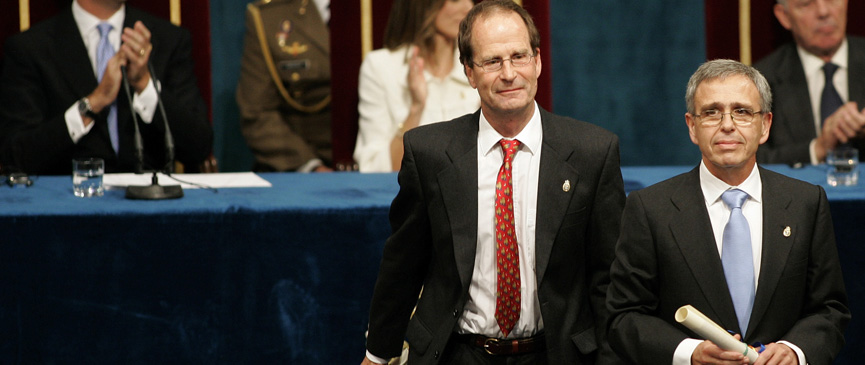The Princess of Asturias Foundation
Sección de idiomas
Fin de la sección de idiomas
Sección de utilidades
Fin de la sección de utilidades
- The Foundation
- HM The King
- HRH The Princess of Asturias
- 2023 Special
- Princess of Asturias Awards
- Area of Communication and Media
- Music Department
- Exemplary Town of Asturias Award
- 2012 Special
- 2013 Special
- 2014 Special
- 2015 Special
- 2016 Special
- 2017 Special
- 2018 Special
- 2019 Special
- 2020 Special
- 2021 Special
- 2022 Special
-
Important: COVID-19
-
Terms of Use
You are in:
Laureates
Start of main content
Peter Lawrence and Ginés Morata
Prince of Asturias Award for Technical & Scientific Research 2007

At its meeting in Oviedo, the Jury for the 2007 Prince of Asturias Award for Technical and Scientific Research - made up of José Luis Álvarez Margaride, Juan Luis Arsuaga, Pedro Miguel Echenique Landiríbar, Antonio Fernández-Rañada, Luis Fernández-Vega Sanz, María del Carmen Maroto Vela, Amparo Moraleda, Enrique Moreno, Rafael Nájera Morrondo, César Nombela Cano, Fernando Ortiz Maslloréns, Ana Pastor Julián, Miguel Ángel Pesquera, Eduardo Punset, Rafael Sariego García, Guillermo Suárez Fernández, Guillermo Ulacia, chaired by Julio Rodríguez Villanueva and with José Antonio Martínez-Álvarez as secretary, has unanimously decided to bestow the 2007 Prince of Asturias Award for Technical and Scientific Research on both Britain´s Peter Lawrence and Spain´s Ginés Morata.
The Laureates have carried out decisive work, both in Cambridge and in Madrid, and have continued to join forces in a collaborative effort that began at Cambridge University´s prestigious Laboratory of Molecular Biology, which has witnessed numerous advances in basic research. Likewise, with this award, the Jury wishes to acknowledge the Spanish school of developmental biology, which is fundamental for this discipline at an international level.
The studies done by Lawrence and Morata are crucial in order to understand clearly some of the details involved in the formation of complex organisms. Their pioneering research has brought to light the workings of biological compartments, as units which regulate embryonic development by means of molecular gradients and gene clusters. Both scientists´ efforts to establish morphogenetic processes, based on simple experimental models, make it possible to study topics of considerable complexity. Included amongst these is the role played by some highly conserved genes, identified in species ranging from insects to animals, and the formation of cell lineages which lead to the differentiation of organs such as eyes and wings.
The work of Lawrence and Morata, alone or in collaboration, provides information on the phenomenon of organ and tissue regeneration and on programmed cell death, also known as apoptosis, which are indispensable in the study of ageing and cancer.
The scientific discoveries, of universal value, of professors Lawrence and Morata are the basis for the advances in understanding that will have far-reaching effects on medicine in the future.
Oviedo, 20th June, 2007
End of main content
Sección de utilidades
Fin de la sección de utilidades
- Legal document Legal document (Access key 8)
- | Privacy policy Privacy policy (Access key )
- | Social networks ???en.portal.pie.menu107.title???
- | Cookies ???en.portal.pie.menu110.title???
- | Site map Site Map (Access key 3)
- | Contact Contact (Access key )
- | XHTML 1.0
- | CSS 2.1
- | WAI 'AA
© Copyright 2024. FUNDACIÓN PRINCESA DE ASTURIAS



